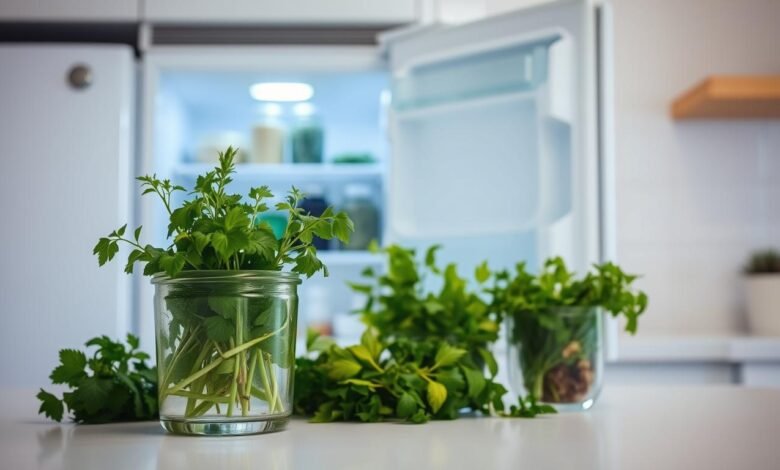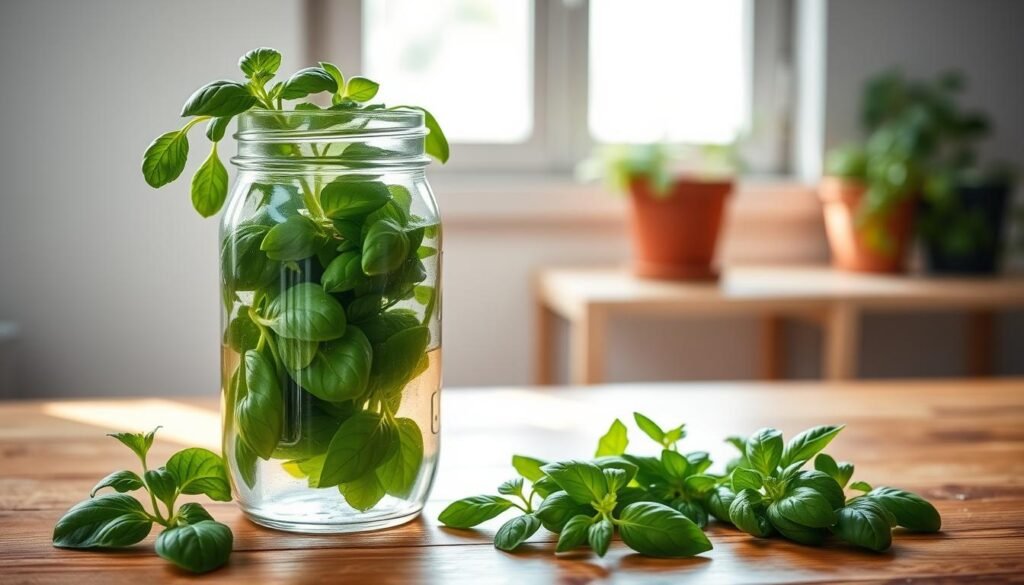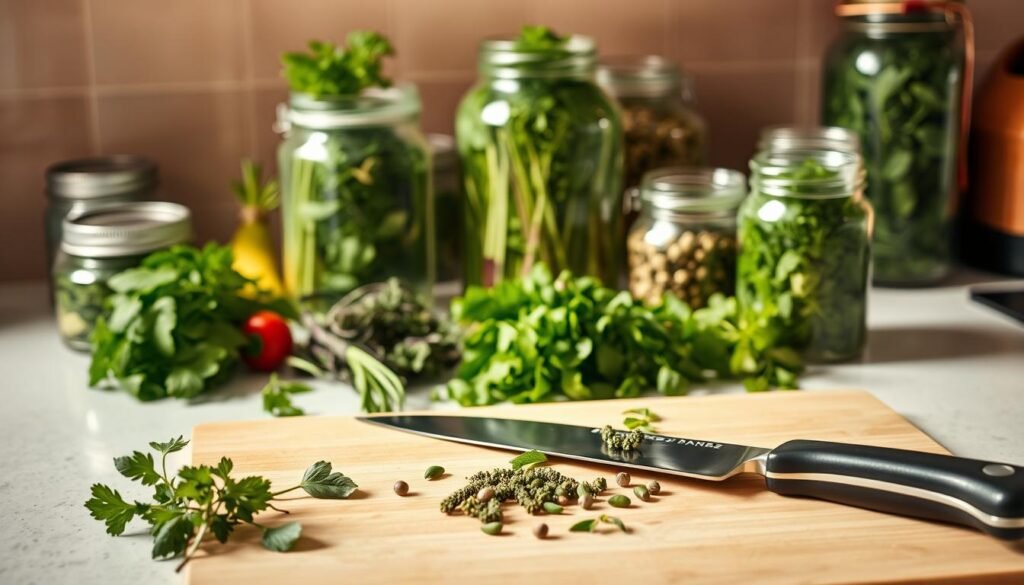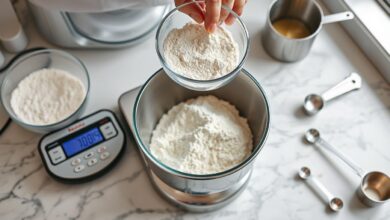
How to store fresh herbs in fridge — You just spent eight dollars on that beautiful bunch of basil at Whole Foods, only to find it wilted and black three days later. Your heart sinks as you toss another handful of herbs into the trash. Sound familiar? You’re not alone in this kitchen frustration.
Fresh herbs bring life to your cooking, turning simple meals into restaurant-quality dishes. But keeping them fresh feels like an impossible task. The good news is that learning how to store fresh herbs in fridge properly can save your herbs, your money, and your sanity.
The secret lies in understanding what each herb needs to thrive in your refrigerator. Some herbs love moisture while others despise it. Some prefer the cold while others need protection from it. Once you master these refrigerator herb storage techniques, you’ll enjoy fresh herbs for weeks instead of days.
Your refrigerator can become a herb sanctuary with the right approach. The best way to preserve herbs isn’t complicated or time-consuming. It just requires knowing which method works for each type of herb in your kitchen.
Key Takeaways
- Different herbs need different storage methods based on their structure and moisture needs
- Proper storage can extend herb freshness from days to several weeks
- The right temperature and humidity levels prevent wilting and decay
- Simple tools like paper towels and glass jars make effective storage containers
- Tender herbs like basil require different care than hardy herbs like rosemary
- Pre-storage preparation greatly impacts how long herbs stay fresh
Understanding the Basics of Herb Storage in Your Refrigerator
Fresh herbs can make any dish special. But, they need careful handling because they’re delicate. Knowing how to store different herbs can make them last longer and save money. The fridge is a great place to keep herbs fresh if you know what each type needs.
Why Proper Storage Matters for Fresh Herbs
Fresh herbs have essential oils that give them their flavor. These oils can disappear quickly if not stored right. Herbs start losing nutrients as soon as they’re picked, so using the right containers is key. With the right care, your herbs can stay fresh for one to three weeks.
Common Mistakes That Lead to Wilted Herbs
There are a few mistakes that can ruin your herbs:
- Washing herbs before storage adds too much moisture
- Sealed containers without air let humidity build up
- Storing different herbs at the same temperature
- Keeping herbs near fruits that release ethylene gas
- Not considering the fridge’s temperature changes
The Science Behind Herb Freshness and Moisture Control
Herbs need the right amount of moisture to stay fresh. Too much water can cause them to rot. Too little makes them dry out. Light can turn them yellow by damaging chlorophyll. Oxygen can also cause them to brown faster.
| Storage Factor | Effect on Herbs | Ideal Range |
|---|---|---|
| Humidity | Prevents dehydration | 90-95% |
| Temperature | Slows decay | 32-40°F |
| Air Circulation | Reduces mold growth | Gentle flow |
How to Store Fresh Herbs in Fridge
Fresh herbs can make any dish special. But, they need the right storage to stay fresh. Your fridge can be perfect for this if you know how. Each herb has its own needs, and knowing these can keep your food tasting great for days or weeks.
The Paper Towel Method for Delicate Herbs
Delicate herbs need gentle care to keep their texture and taste. First, wash and dry your herbs well. Then, wrap them in a damp paper towel to keep them moist but not soggy. Put the herbs in a plastic bag, but leave it a bit open for air.
This method is great for:
- Dill and chives
- Tarragon
- Delicate leafy herbs
Using Water Storage for Hardy Stemmed Herbs
Hardy herbs can be treated like fresh flowers to last longer. Store them stem-down in water glasses to keep them fresh. Cut the stems at an angle and put them in a jar with water. Cover the leaves with a plastic bag to keep them moist. This method helps keep cilantro fresh and green.
Creating the Perfect Humidity Environment
The secret to keeping herbs fresh is finding the right balance of moisture and air. Keep your fridge between 35-40°F for best results. Use bags or containers with small holes to avoid too much moisture. For basil, it likes warmer spots, so put it in the fridge’s warmest area or store it on the counter.
Best Containers and Tools for Refrigerator Herb Storage
Choosing the right storage containers is key to keeping herbs fresh. You need containers that control moisture and let air in. This is the first step in keeping your herbs fresh for weeks.
Glass jars filled with water are great for herbs with strong stems. Put herbs like parsley, cilantro, and mint in a jar with an inch of water. Then, cover it loosely with a plastic bag to keep it moist. This method is one of the best ways to keep parsley fresh.
- Plastic containers with ventilation holes – These prevent condensation while maintaining humidity
- Specialized herb keepers – Features water reservoirs and adjustable lids for optimal freshness
- Mesh produce bags – Allow herbs to breathe while retaining essential moisture
- Silicone food storage bags – Reusable and airtight for delicate herbs like basil
Don’t use metal containers for storing fresh herbs. Metal can change the flavor of herbs by reacting with their natural oils and acids. Use glass, plastic, or silicone instead for the best results.
The secret to keeping herbs fresh is finding the right containers. They should keep herbs from getting too wet or too dry. You might need to adjust these methods for different types of herbs.
Storing Tender Leafy Herbs Like Basil and Cilantro

Tender leafy herbs need extra care to stay fresh and flavorful. Unlike hardy herbs, delicate varieties like basil and cilantro bruise easily. They lose their vibrant taste quickly when stored incorrectly. Understanding the unique needs of each herb will help you enjoy their fresh taste for days longer.
Special Care for Basil Storage Tips
Basil is one of the trickiest herbs to store because it hates cold temperatures. Your refrigerator can actually damage basil leaves, turning them black and mushy. For keeping basil fresh longer, treat it like a bouquet of flowers.
Trim the stems at an angle and place them in a glass jar with about an inch of water. Cover the leaves loosely with a plastic bag and keep the jar on your kitchen counter at room temperature.
Change the water every two days to prevent bacteria from growing. This simple method keeps basil perky and aromatic for up to a week.
How to Store Cilantro in Refrigerator Without Wilting
Unlike basil, cilantro thrives in cooler conditions. For storing cilantro in refrigerator, start by trimming the bottom inch of stems. Place the bunch in a jar with fresh water, just like flowers.
Cover the leaves with a loose plastic bag to create humidity. Store the jar in your refrigerator door where temperatures stay consistent.
Maintaining Flavor in Delicate Herbs
These herb freshness tips work for other delicate herbs too:
- Wash herbs only when ready to use them
- Handle gently to avoid bruising leaves
- Keep herbs away from ethylene-producing fruits
- Check daily and remove any yellowing leaves
Preserving Hardy Herbs Including Parsley and Thyme
Hardy herbs like parsley and thyme need special care. They have less moisture, making them great for certain storage methods. These methods help keep herbs fresh for weeks, not just days.
Parsley Preservation Methods That Work
Parsley does well in water storage to keep it fresh longer. Cut the stems at an angle and put them in a glass jar with an inch of water. Then, cover the leaves with a plastic bag and store it in the fridge. This way, parsley stays fresh for up to three weeks.
Make sure the leaves are dry before storing. Wet parsley gets dark spots and spoils fast. If they’re wet, gently pat them dry with paper towels. Change the water every few days to stop bacteria from growing.
Keeping Woody Herbs Fresh Longer
Herbs like rosemary and thyme do best with dry storage. They like little moisture to stay fresh. Wrap them in damp paper towels and put them in a plastic bag with holes.
Store sage and bay leaves in paper bags in your crisper drawer. This keeps their intense flavors and stops moisture buildup. The paper absorbs humidity, creating a perfect spot for these herbs to stay fresh for weeks.
Maximizing Herb Shelf Life Through Proper Preparation

The key to keeping herbs fresh starts at the store. Choose herbs with bright green leaves and strong stems. Avoid any with dark spots or yellowing. Fresh herbs should smell strong and fresh when you rub them gently.
When you get home, prepare them right. Remove any damaged leaves to stop decay. Sort herbs by type because they need different care. Basil likes room temperature, while parsley prefers cold.
Managing water is key to keep herbs from wilting. Don’t wash herbs until you’re ready to use them. Washing them can make them spoil faster. If you must wash, dry them well with paper towels before storing.
Trim stem ends at a 45-degree angle with sharp scissors. This helps them absorb water better, keeping them fresh longer. Put herbs like rosemary and thyme in water. Wrap herbs like cilantro in damp paper towels.
Organize herbs by their storage needs to save time and reduce waste. Group similar herbs together and label containers with dates. This makes it easy to use older herbs first and keep track of freshness.
Troubleshooting Common Herb Storage Problems
Storing herbs in the fridge can sometimes go wrong. You might see yellow leaves, brown spots, or wilting. These issues can quickly ruin your fresh herbs. Knowing how to fix these problems helps keep your herbs fresh for weeks.
Preventing Yellowing and Browning
Yellow leaves often mean your herbs are too old or too cold. Make sure they’re not too close to the freezer vents. Move them to a warmer area, like the middle shelf of your fridge.
Stay away from apples, tomatoes, and bananas. They release gas that makes herbs spoil faster.
Brown spots are usually from cold damage or bacteria. Keep your fridge at 35-40°F for best herb storage. Remove any brown leaves to stop the problem from spreading.
Dealing with Excess Moisture and Mold
Too much moisture leads to mold. Dry herbs well with paper towels before storing. Wrap them loosely to let air in and keep them fresh longer. If you see mold, throw away the affected herbs right away.
Reviving Slightly Wilted Herbs
Don’t give up on herbs that look a bit wilted. Cut the stems at an angle and soak them in ice water for 15-30 minutes. This can revive them. After soaking, dry them well before putting them back in storage.
Alternative Preservation Methods Beyond Refrigeration
Refrigeration is great for short-term storage, but other methods can keep your herbs fresh longer. These techniques help preserve the herbs’ flavor and nutrients. This way, you can enjoy the taste of fresh herbs all year round.
Freezing is a top choice for preserving herbs with little flavor loss. Freeze herbs in ice cube trays with water or olive oil. This makes it easy to add flavor to soups, stews, and sauces. Just add a cube to your dish for a burst of herb flavor. Basil, parsley, and cilantro freeze well using this method.
Air-drying is perfect for herbs like rosemary, oregano, and thyme. Tie stems together and hang them in a dry, dark spot. In about two weeks, you’ll have crispy herbs to store in airtight containers. For quicker results, try your oven on the lowest setting or use a food dehydrator.
Herb-infused oils and vinegars keep fresh flavors in liquid form. These make great gifts and add flavor to salads and marinades. Among parsley preservation methods, oil infusion keeps the herb’s color and taste for months when stored right.
Salt preservation turns fresh herbs into tasty seasonings. Mix chopped herbs with coarse salt in jars for a concentrated flavor. Herb butters are another smart choice—mix minced herbs into softened butter, roll in parchment paper, and freeze. These tips help you always have fresh seasonings ready.
Creating Your Own Herb Storage System
Having an organized herb system makes cooking easier and keeps herbs fresh. Knowing where each herb is in your fridge helps you use them before they go bad. This saves money and cuts down on waste.
Organizing Multiple Herbs in Your Refrigerator
Give your fridge a special herb area. The crisper drawer is perfect for soft herbs like cilantro and dill. Harder herbs like rosemary and sage fit well in the door compartments. Use clear containers so you can see what’s inside without opening them.
Labeling and Rotation Strategies
Mark each container with the date you bought or picked it. Put newer herbs behind older ones to use the oldest first. This keeps your herbs from getting forgotten and turning bad.
Making the Most of Limited Fridge Space
Stack containers to save space. Use magnetic holders on the fridge walls for more storage. Small suction cup containers are great for unused fridge surfaces. Even a small fridge can hold many herbs with the right storage.
Conclusion of How to store fresh herbs in fridge
How to store fresh herbs in fridge — Learning to keep herbs fresh can change your cooking and save money. You’ve discovered that each herb needs special care. From basil to rosemary, the right methods can make them last weeks, not just days.
Your fridge can be a key to keeping herbs fresh. By using paper towels, water, and the right containers, you can keep herbs fresh. Small things like temperature and moisture control are very important.
You can now set up a great system for storing herbs in your kitchen. Regular checks and rotation help avoid waste. These easy tips will make your meals better and stretch your budget.
Begin using these tips with the herbs you have today. Your future self will thank you for having fresh, fragrant herbs at the ready.
FAQ : How to store fresh herbs in fridge
What’s the best way to preserve herbs in the refrigerator?
The best method varies by herb type. For soft herbs like cilantro and parsley, store them upright in a jar with water. Cover the leaves with a plastic bag. For tough herbs like thyme and rosemary, wrap them in damp paper towels and put them in a bag with holes.
Always dry herbs before storing. Keep the right humidity to stop them from wilting.
How long can you keep basil fresh in storage?
Basil is special because it doesn’t like cold. Keep it fresh at room temperature in a jar of water. Cover it with a loose plastic bag. It can last up to two weeks this way.
Don’t put basil in the fridge. Cold temperatures can turn the leaves black and lose their taste.
What are the best herb storage containers for the refrigerator?
Glass jars are great for herbs in water. Use plastic containers with holes for the paper towel method. Herb keepers with water and adjustable lids are best.
Mesh bags and bags with holes also work. But avoid metal containers as they can change the taste of herbs.
How do you prevent wilting herbs in the fridge?
Keep the right moisture by wrapping herbs in damp paper towels. Make sure they have air with containers that let air in. Store them at 35-40°F.
Change the water in jars every 2-3 days. Remove any yellow or damaged leaves right away.
What’s the proper way to store cilantro in the refrigerator?
Cut the cilantro stems at an angle and put them in a jar with water. Cover the leaves with a plastic bag. This keeps it humid. Then, refrigerate it.
Change the water every 2-3 days. This way, your cilantro can last up to three weeks.
How can you extend herb shelf life beyond normal refrigeration?
You can freeze herbs in ice cube trays with water or oil. Dry them using air or a dehydrator. Or, preserve them in salt.
Make herb-infused oils, vinegars, pestos, or butters. These can last months when stored right.
What are the most common herb storage mistakes to avoid?
Don’t wash herbs before storing. Excess moisture causes rot. Use containers that let air in, not airtight ones.
Store herbs at different temperatures based on their needs. Don’t store them near fruits that give off ethylene. Avoid overcrowding and remove damaged leaves quickly.
How do you organize multiple herbs in your refrigerator for maximum freshness?
Set aside a spot for herbs in your fridge. Use clear containers for easy identification. Store water herbs together and paper towel herbs separately.
Label each container with the herb name and date. Use a first-in, first-out system. Use vertical space with stackable containers or magnetic holders.



